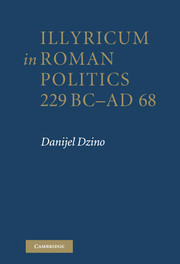Book contents
- Frontmatter
- Contents
- List of figures
- List of maps
- List of tables
- Acknowledgments
- Timeline
- 1 Introduction, approaches, review of sources and secondary literature
- 2 Illyricum in Roman foreign affairs: historical outline, theoretical approaches and geography
- 3 Roman trans-Adriatic engagement (229–168 BC)
- 4 Rome across the Adriatic in the late Republic (167–59 BC)
- 5 The construction of Illyricum: Caesar in Illyricum and the Civil Wars (59–44 BC)
- 6 Octavian in Illyricum
- 7 From senatorial to imperial Illyricum: Bellum Pannonicum
- 8 The failure of Greater Illyricum: the Bellum Batonianum
- 9 Iulio-Claudians in Illyricum: the tale of two provinces
- Conclusion: the construction of Illyricum in Roman political discourse
- Bibliography
- Index
7 - From senatorial to imperial Illyricum: Bellum Pannonicum
Published online by Cambridge University Press: 05 May 2010
- Frontmatter
- Contents
- List of figures
- List of maps
- List of tables
- Acknowledgments
- Timeline
- 1 Introduction, approaches, review of sources and secondary literature
- 2 Illyricum in Roman foreign affairs: historical outline, theoretical approaches and geography
- 3 Roman trans-Adriatic engagement (229–168 BC)
- 4 Rome across the Adriatic in the late Republic (167–59 BC)
- 5 The construction of Illyricum: Caesar in Illyricum and the Civil Wars (59–44 BC)
- 6 Octavian in Illyricum
- 7 From senatorial to imperial Illyricum: Bellum Pannonicum
- 8 The failure of Greater Illyricum: the Bellum Batonianum
- 9 Iulio-Claudians in Illyricum: the tale of two provinces
- Conclusion: the construction of Illyricum in Roman political discourse
- Bibliography
- Index
Summary
ILLYRICUM IN THE FIRST YEARS OF THE PRINCIPATE: THE PAX AUGUSTA
In 33 BC Octavian's campaigns were finished, and Illyricum was in a few years a de iure Roman province. In 30 BC the Roman Civil Wars ended and Octavian was finally supreme master of the Mediterranean. There is some symbolic connection between the fortunes of the first princeps and Illyricum, as military victories in Illyricum in 33 and 9 BC mark the high points of his political career, and the Bellum Batonianum of AD 6–9 coincides with the darkest hours of his foreign policy.
There is no space here to discuss in depth the great social and political changes in the Roman world that followed the victory of Octavian in the Civil Wars. The battle of Actium and the new constitution from 27 BC finished the long socio-political process of Rome's transformation. Political power had already shifted from the Senate more than two decades before, but this time, instead of two or three, there was only one unchallenged master of the empire – Augustus. However, the transformation was not yet completely finished in the first years of the Principate. The new system needed some time to consolidate, working by trial and error rather than following some pre-determined plan. Augustus implemented a series of reforms patiently and gradually during the whole of his long reign, carefully avoiding a definition of the exact extent of his non-constitutional powers, keeping the façade of constitutional and traditional government, but concentrating all power in his hands and preserving it for members of his family.
- Type
- Chapter
- Information
- Illyricum in Roman Politics, 229 BC–AD 68 , pp. 117 - 136Publisher: Cambridge University PressPrint publication year: 2010



